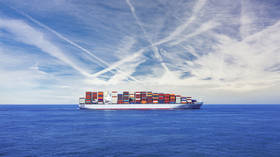The trillion dollar push to decarbonize global shipping

Freight ships are huge carbon emitters and if countries and companies hope to meet Paris Agreement targets they must change the way freight shipping is managed, making it greener by using electric batteries or alternative fuels.
At present, shipping products across the ocean using freight ships creates more greenhouse-gas emissions than the estimated two billion US cars and trucks on America’s roads, at around one billion metric tonnes. The shipping industry is thought to produce between 2 and 3 percent of global carbon emissions. Maritime shipping contributes around 10 to 15 percent of all sulfur- and nitrogen-oxide emissions. And, in reality, very little is known about the shipping freight emissions of some of the world’s largest companies as very few report these types of emissions.
Also on rt.com Brussels comments on future of nuclear power amid widespread energy crisisBut changing the face of freight shipping is not a simple task. First, manufacturers must consider the best renewable energy to use in fuelling these mammoth ships. And then there is the cost. The cost of developing the alternative fuel, of switching to said fuel, and the cost of changing all the mechanics inside the ship to make it run on the new fuel. To this end, the Global Maritime Forum estimates that to meet the International Maritime Organization (IMO) 2050 emissions target by switching to ammonia fuel, it would cost over $1.15 trillion.
But the work has already begun. This June, the IMO’s Marine Environment Protection Committee tightened ship efficiency requirements starting in November 2022, developing upon its 2018 strategy. The IMO has already introduced targets to reduce carbon emissions over the next decade, with the aim of a 40% reduction of CO2 emissions from international shipping by 2030 and a 70% reduction by 2050, compared to 2008, in line with Paris Agreement targets.
In terms of major individual shipping companies, in 2018, Maersk set the target of zero carbon emissions from operations by 2050. The aim is to have commercially viable carbon-neutral ships available by 2030 to achieve this goal. Soren Toft, Chief Operating Officer of Maersk explained, “The only possible way to achieve the so much needed decarbonisation in our industry is by fully transforming to new carbon-neutral fuels and supply chains.”
Readmore on Oilprice.com: Why everyone should support cutting methane emissions
Other companies are looking to change practices in the short term to encourage greater decarbonization until a long-term solution is available. For example, the Swedish/Norwegian shipping company Wallenius Wilhelmsen suggested lengthening transit times, as reducing the speed of its ships could decrease CO2emissions by as much as 20 percent. But this option, unsurprisingly, is not popular among most shipping companies that run to strict timeframes.
Windward, a predictive maritime intelligence company, believes they can help reduce emissions by using artificial intelligence (AI). The company has started using AI systems to measure fuel use and waste to improve carbon management. Instead of using assumptions of fuel use, Windward’s systems accurately track fuel use over time, speed, and location to provide a more detailed breakdown. They are now encouraging the greater uptake of AI systems in shipping through their ‘Data For Decarbonisation’ program.
Also on rt.com The energy crunch is adding billions to oil tycoons’ net worthOne cohesive proposal that came out of the 8th Annual World Ocean Summit Virtual Week in June is the potential for a research and development fund to be used to develop new technologies for carbon-neutral shipping. The funding would come from a $2 per tonne of fuel mandatory levy, contributing around $5 billion within a decade.
Now some are speculating that electric batteries may be used in the future of freight shipping. The US-based startup Fleetzero is constructing battery-electric cargo ships, in the hopes of decarbonizing the shipping industry as well as boosting freight potential through greater access to international ports. The co-founders of the company hope to develop the technology to fully convert a small diesel ship by as early as 2022.
Read more on Oilprice.com: Oil prices slide on fears of tighter fed policy
This trend was predicted by Elon Musk in 2017, “Everything will go fully electric, apart from (ironically) rockets. Ships are the next easiest to solve after cars.” Although until recently this seemed like a pipedream.
Fleetzero is testing the use of electric batteries in 20-foot shipping containers in Alabama, which are modified to power smaller ships so they can be swapped out with the container carrier once it enters the port. Co-founder Steven Henderson explains, “Our ships use rapid battery swapping to refuel, and in doing that we’re able to distribute the costs of our batteries over a greater number of shipping containers to a point where we can be competitive with diesel ships.”
Also on rt.com Russia joins COP26 agreement to end deforestation as Putin dubs conservation a 'key component' of battling climate changeInnovative solutions such as these are becoming increasingly necessary if major international companies hope to meet their climate targets, with Amazon, Ikea, and Unilever all pledging net-zero emissions shipping by 2040. This pledge was agreed upon by nine multinationals, but major funding is required to speed up the development of alternative fuels and technologies to be used on a wider scale
While it is clear that companies around the globe want to decarbonize freight shipping over the coming decades, the jury is out on exactly how this will be done. To achieve carbon-cutting pledges in the shipping industry in line with Paris Agreement targets, both state governments and multinational companies must establish a cohesive strategy and fund to speed up the development of new fuels and technologies to be used in shipping.
For more stories on economy & finance visit RT's business section












